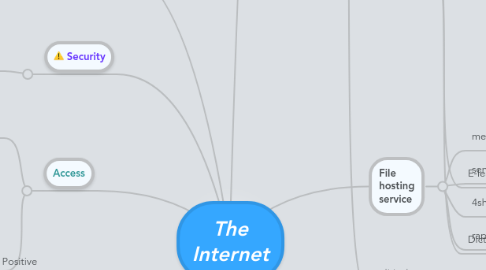
1. Impact
1.1. Positive
1.1.1. social
1.1.2. economic
1.1.3. cultural
1.2. Negative
1.2.1. hacker
1.2.2. e-waste
1.2.3. virus
1.2.4. cyber-bullying
2. Access
2.1. Browser
2.1.1. Internet Explorer
2.1.2. Mozilla Firefox
2.1.3. Safari
2.1.4. Google Chorome
2.1.5. Opera
2.2. electronic applications
2.2.1. computer
2.2.2. mobile
2.2.3. Ipads
3. Security
3.1. Anti-virus
3.1.1. Kaspersky
3.1.2. McaFree
4. Internet freedom of speech
4.1. Electronic Frontier Foundation
4.2. China
5. File hosting service
5.1. mediafire
5.2. sendspace
5.3. 4shared
5.4. rapidshare
6. Development
6.1. Background
6.1.1. the Defense Advanced Research Projects Agency
6.1.2. Leonard Kleinrock
6.1.3. TCP/IP
6.1.4. HTML
6.1.5. Sir Tim Berners-Lee
6.2. 1950s
6.2.1. point to point communication
6.2.1.1. mainframe computer
7. Usage
7.1. business
7.1.1. promotion
7.1.1.1. digital arts
7.1.2. e-shopping
7.1.2.1. eBay
7.1.2.2. Amazon
7.1.2.3. Yahoo! bidding
7.1.3. online application
7.1.4. online delievery
7.1.5. e-banking
7.2. entertainment
7.2.1. communication
7.2.1.1. social network platform
7.2.1.1.1. Tumblr
7.2.1.1.2. Google+
7.2.1.1.3. Facebook
7.2.1.1.4. Twitter
7.2.1.1.5. Weibo
7.2.1.2. E-mail
7.2.1.2.1. Yahoo! mail
7.2.1.2.2. Google mail
7.2.1.2.3. Hotmail
7.2.1.3. messenger
7.2.1.3.1. ICQ
7.2.1.3.2. MSN
7.2.1.4. Forums
7.2.2. media
7.2.2.1. Videos
7.2.2.1.1. Tudou
7.2.2.1.2. Youtube
7.2.2.1.3. Youku
7.2.3. Blogs
7.3. academic
7.3.1. research
7.3.1.1. search engines
7.3.1.1.1. Yahoo!
7.3.1.1.2. Google
7.3.1.1.3. bing
7.3.1.1.4. Wikipedia
7.3.1.1.5. One Search
7.3.1.1.6. Volunia
7.3.1.1.7. msn
7.3.2. E-learning
7.3.2.1. Blackboard
7.3.2.2. Moodle
7.3.2.3. eclass
7.3.3. Dictionaries
7.4. political
7.4.1. e-announcements
